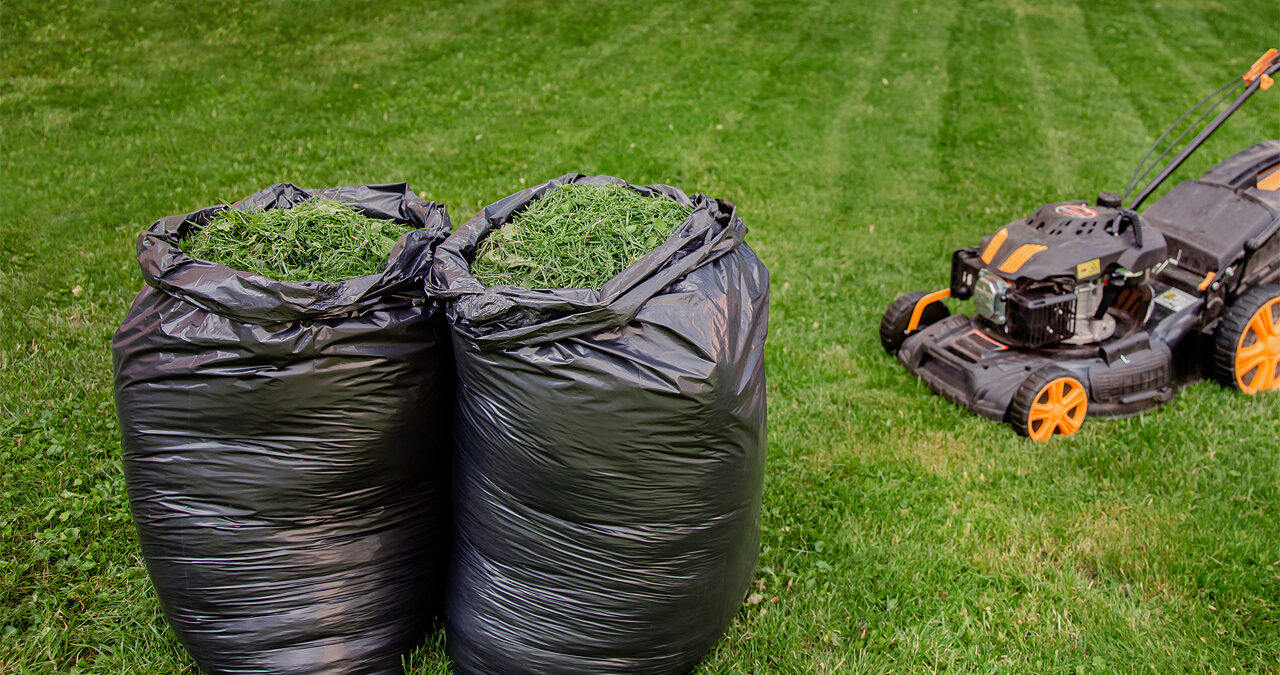
Is bagging grass clippings necessary for a healthy lawn in Wichita? Homeowners often ask this question, unsure if it benefits or harms their lawn. In short, there are a lot of factors homeowners should consider when deciding whether to bag grass clippings, all of which can impact the health and appearance of your lawn. As an experienced Wichita landscape company, Elite Landscape Solutions offers a breakdown on bagging grass clippings, helping you make the best choice for your lawn.
The Case for Mulching (Grasscycling)
Benefits of Mulching Grass Clippings
The Environmental Protection Agency estimates that over 35 million tons of yard waste are disposed of every year in the United States. One way to help combat this rising number is through grasscycling. This is the process of leaving clipping on your lawn to act as a mulch. Not only does this cut back on waste, but the clippings also act as a natural fertilizer by releasing nitrogen, potassium and phosphorus back into the soil.
Mulching your grass clippings also promotes moisture retention by returning the water in the grass clippings to the roots of the grass blades. This can help reduce water consumption during droughts. Leaving the grass also saves time and effort, allowing you to spend more admiring your luscious, healthy lawn.
Other benefits to mulching grass clippings:
- Discourages weed growth
- Cost savings, reduce money spent on trash bags and waste disposal.
- Reduces likelihood of certain lawn diseases
- Helps support biodiversity throughout your lawn
Ideal Conditions
Grasscycling is great for your lawn; however, there are ideal times and conditions that homeowners should be aware of. Regular mowing and keeping the clippings short are key; this prevents thatch build-up and allows for faster decomposition, returning nutrients to the soil quickly. Another good rule of thumb is to only use clippings when the lawn is healthy and free of disease because using infected grass clippings may spread fungus or disease. Lastly, only use dry clippings, as clumps of grass can hide fungi and other diseases.
How to Mulch Effectively
Homeowners can start mulching effectively by using proper mowing techniques. We recommend always mowing when your lawn is dry to prevent clumps. Next, make sure your lawn mower blades are sharp. Kansas State University also suggests homeowners use the ⅓ rule when cutting your grass. These practices promote healthier growth and faster decomposition of clippings. Finally, cut at the height according to your type of grass. Grass blades that are too short may weaken the grass, making it susceptible to disease.
The Case for Bagging
Benefits of Bagging Grass Clippings
On the surface, bagging grass clippings is an easy way to maintain a clean look for your lawn. Under the surface though, your grass benefits in other ways. For one, bagging helps by removing excessive grass clippings that would contribute to thatch buildup. Disposing of infected grass clippings is also a great way to prevent the spread of lawn diseases such as fairy rings. Lastly, bagging clippings is a versatile way to create a nutrient-rich compost for flower gardens or other landscaping projects.
Other benefits of bagging grass clippings:
- Can reduce the spread of weed seeds
- Reduced fire hazard
- Reduced moss growth
- Minimizes exposure to airborne allergens
When to Bag
There are often specific times when it is best to bag lawn clippings. Consider bagging clippings if your lawn is battling infection or disease to prevent further spread. It is also important to bag grass clippings when grass blades are overgrown as they can lead to fungal diseases, smothering and thatch buildup.
Local Considerations: Wichita’s Climate and Grass Types
Warm-Season Grasses: It’s important to be aware how Wichita’s climate can impact grass. In general, mulching benefits warm-season grasses like Bermuda and Zoysia, both common options in Wichita.
Composting: Using grass clippings as compost is a popular way to increase drought tolerance for flower gardens, as well as provide nutrients like nitrogen for areas of your landscape that require minimal fertilizing.
Thatch Buildup: When mulching grass clippings it’s crucial to keep a close watch on warm-season grasses common in Wichita. Bermuda and Zoysia grasses tend to develop thatch, so regular aeration and proper mulching are crucial to keep your lawn healthy.
Factors to Consider When Deciding Whether to Bag or Mulch
- Lawn Health: Is your lawn healthy and free of disease?
- Grass Type: What type of grass do you have?
- Aesthetics: Do you prefer a tidy, manicured look or a more natural one?
- Time/Effort: How much time and effort are you willing to invest?
- Environmental Concerns: Are you interested in reducing waste?
Bagging vs. Mulching: The Choice is Yours
Deciding whether to bag or mulch your grass clippings comes down to understanding their impact on your lawn’s health. We encourage homeowners to experiment and find the best process that works for their yard. If you need additional help, contact Elite Landscape Solutions in Wichita with your questions, we’re always happy to help.
